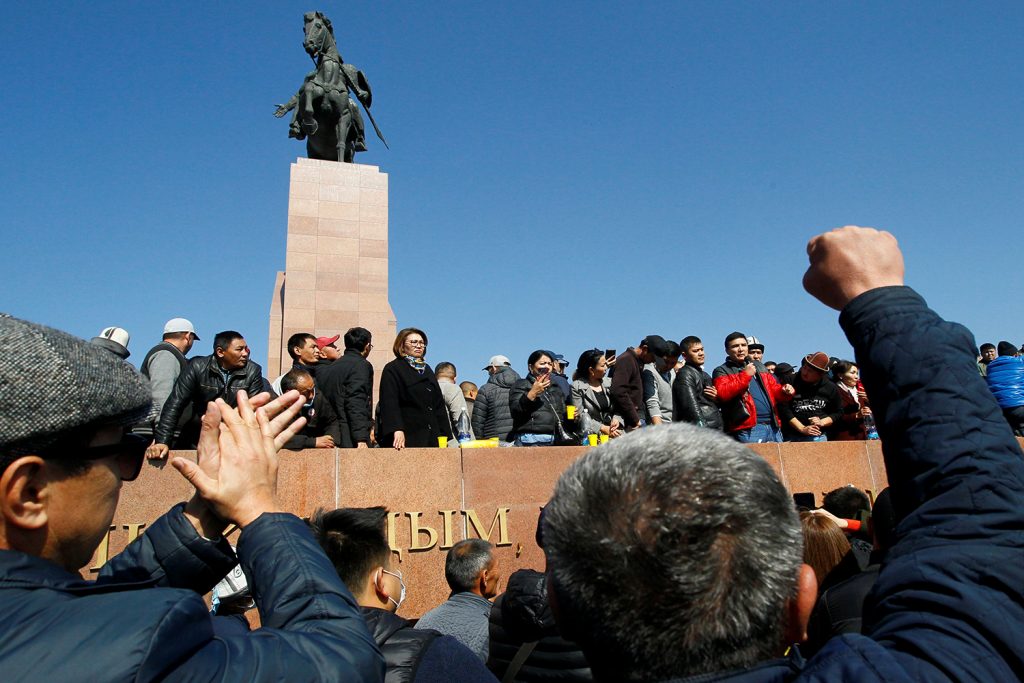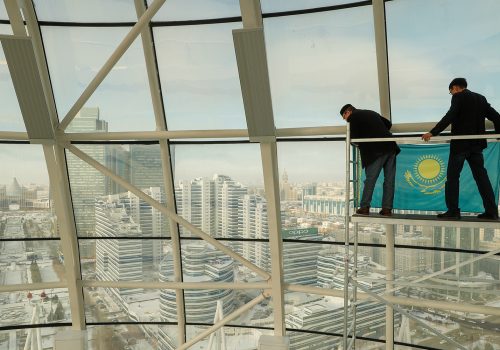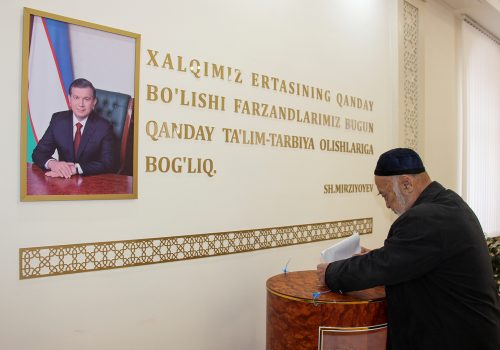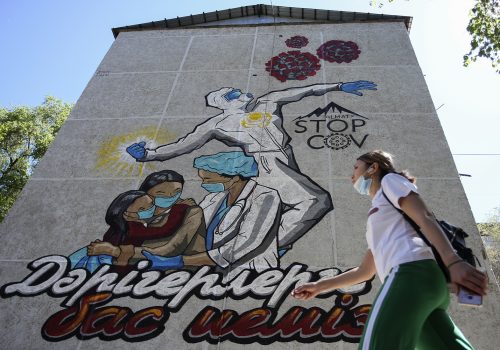For the third time in fifteen years, citizens in Kyrgyzstan rose up in protest, as opposition groups took over government buildings amidst charges of vote rigging in the recent parliamentary elections. Demonstrations on October 6 saw hundreds wounded and one person killed, as protestors broke into government buildings, freed imprisoned ex-president Almazbek Atambayev, and forced President Sooronbai Jeenbekov into hiding.
Opposition groups remain out in the streets in the capital of Bishkek, although there have now been clashes between these protestors and vigilantes. Election officials have promised to rerun the October 4 elections due to the disputed result, but President Jeenbekov has not relinquished power and various political groupings have attempted to install rival prime ministers during the chaos.
Atlantic Council experts respond to the recent instability in Kyrgyzstan and what it means for the region and the international community:
Jump to an expert reaction:
Noah Tucker: US and EU should side with the next Kyrgyz generation
Baktybek Beshimov: Instability shows Kyrgyzstan is a failed state
Ariel Cohen: Kyrgyzstan is developing an immunity to authoritarianism.
Nurlan Namatov: Important challenges remain for Kyrgyzstan.
US and EU should side with the next Kyrgyz generation.
“The situation in Kyrgyzstan is evolving very rapidly, and I hesitate to attempt to sum up the facts as we know them because they could change so quickly. While on one hand government collapse is a painfully familiar situation in Bishkek and regular citizens and activists alike are working hard to form volunteer brigades to keep the peace prevent any public violence, ordinary citizens were never the real threat in the first place. Three competing groups claim the right to act as a provisional parliamentary government: a small fraction of current deputies who claim to have held an “extraordinary session” of parliament in a Bishkek hotel and re-appointed former PM Sadyr Japarov, who had been serving a jail sentence on kidnapping charges earlier this week, and two rival councils made up of opposition political parties that had been set to be excluded from power by the October 4 election now nullified by the Central Electoral Commission. None of them have any clear legal authority, while President Jeenbekov remains in hiding in an undisclosed location and has neither resigned nor attempted to claim continued authority.
“Multiple factions and no clear process of arbitration between competing claims of authority until a new election can be held create a dangerous situation; many of these same political elites have a long history of activating alliances with organized crime and far-right vigilante groups to apply pressure in bids for power. Outside these circles of political power are the much larger mass of ordinary citizens for whom all of these factions and their endless game of musical chairs and use of administrative resources and corruption prosecutions against one another in retribution (while refusing to hold their own party or their allies to the same standard) has lost legitimacy, particularly after spectacular failures in the management of the COVID-19 pandemic and the resulting economic crisis from a precipitous drop in remittances from labor migrants. We see signals of this in spontaneous protests from young people calling for lustration within the political system itself, and rallies led by a younger generation of political leaders demanding that the older generation within their own parties relinquish their positions and give way to new leadership.
“As one of these younger-generation political figures, Kyrgyzstan’s ambassador to the UK Edil Baisalov, has already urged that US and EU policymakers and international press and other observers should avoid being drawn into or leveraged by these competing political factions and stand for the rule of law. Rather than falling for the temptation of short-term gain by siding with one political faction or another in the fear that might otherwise strike a deal with Russia for support—overtures that have already begun—the United States and EU should play the “long game” and side with the next generation of Kyrgyz citizens. We must insist on a true and open democratic process that will give the people of Kyrgyzstan themselves the power to choose their leaders and create legitimate institutions that will offer real justice rather than support the coalition of the day and punish their enemies. Without real democratic institutions, Kyrgyzstan’s fragile and shifting coalitions of parties (that are really only vehicles to support a powerful patron and his network) will continue to erode what is left of the country’s civic and legal institutions and potentially slide into conflict.”
Noah Tucker, nonresident senior fellow at the Atlantic Council’s Eurasia Center
Instability shows Kyrgyzstan is a failed state.
“Kyrgyzstan today is a failed state, suffering from chaos, organized mayhem, and anarchy, with a fragile economy, hit badly by COVID-19, a vulnerable poor population, and an immature corrupt political elite. The probability of state collapse is increasing.
“Kyrgyzstan’s political situation is extremely complicated due to the presence of a mix of political groups with conflicting agendas and the direct participation of criminal groups. Mass protests against the fraudulent election were skillfully used by the criminals who toppled the president and the government, and they are now trying to grab power.
“Jeenbekov’s response has been inadequate and focused on saving the status quo by dealing with some opportunist groups and criminals. He proves today his unfitness to the office and irresponsible attitude to the destiny of the country. De facto, he has lost his credibility as the president, but we don’t know how this would be constituted de Jure.
“The opposition groups are trying to get together to find a legitimate pathway to the future, set a plan, and define the next elections’ timeframe. It is a positive move, and all international actors are interested in that process.
“Putin has already reacted, claiming that the Kremlin is in contact with all the key players in Kyrgyz politics. Given the Russian airbase and other military facilities in Kyrgyzstan, Moscow naturally will do everything to continue to be the decisive foreign force in this country. No doubt, Russia will succeed in its efforts and continue to keep its influence there. Of course, what’s happening in Kyrgyzstan is a bogeyman for all Central Asian authoritarian leaders, and they are in intensive consultations primarily to protect their countries from the effects of the Kyrgyz revolutions.
“The West’s efforts to stabilize the situation in Kyrgyzstan would be helpful. More specifically, the United States and the EU can support the negotiation process, help to restore the consensual order, and peaceful transfer of power through new elections.”
Baktybek Beshimov, Professor of the Practice in the Global Studies and International Relations program at Northeastern University
Kyrgyzstan is developing an immunity to authoritarianism.
“The third revolution in fifteen years is an indication that Kyrgyz society is developing immunity against corrupt and authoritarian rulers. In an surprisingly fast development, the people swept aside the president, annulled the election, which were broadly viewed as falsified, released a former president from jail, and appointed an acting prime minister, a mayor of the capital Bishkek, and a militia (police) chief. The new elections may take place soon.
“This is not the first time the Kyrgyz have kicked out leaders they perceive as corrupt and abusive. Two of the former presidents reside in Russia and Belarus respectively. So far, Kyrgyzstan beat Ukraine with its two Maidans, yet that did not improve the economy or attract foreign investment. The real challenge for the Kyrgyz people is to address the conflicts between clans and between the north and the south, and to ensure that the new leaders and the government will get corruption under control. Whether they need to change the Constitution to achieve that remains to be seen.
“Finally, it is important to understand that Kyrgyzstan may be a model for other countries in Central Asia and in the former Soviet Union where people may think that they exhausted all other available and peaceful means of protest and appeal. I am not a supporter of violence or extra-constitutional means of political struggle, but in the stolen Belarus presidential elections, in the Russian “annulled” constitutional process, or in the forthcoming elections elsewhere—if the powers that be trample on their own laws and brutally abuse police authority and resort to violence, otherwise peaceful citizens may resort to the Kyrgyz recipes to assert their rights.”
Ariel Cohen, nonresident senior fellow at the Atlantic Council’s Eurasia Center
Kyrgyzstan’s long-term stability will depend on ability to find new governance and electoral arrangements.
“The events in Kyrgyzstan are driven by internal factors, most notably by dashed hopes for change after a 2010 revolution. Instead of change, this revolution produced stagnation, incentivized corruption, and severely weakened the legitimacy of the state. The political rules of the game enshrined in the 2010 constitution and electoral rules generated political and economic instability through an inchoate parliamentary system and presidents who serve for one six-year term (without possibility for reelection). The current and previous presidents moved to increase unilaterally their power vis-à-vis weak parliaments and prime ministers. They have also targeted the power and resources amassed by their predecessors. It is not surprising that with just one exception, all former presidents of Kyrgyzstan have been exiled or jailed due to accusations of corruption by their successors.
“Stability will be difficult to achieve without resolving the instability generated by the country’s unique parliamentary system and electoral laws. The most recent prime minister, Kubatbek Boronov, who tendered his resignation this week because of the protests, took office in June after his predecessor resigned due to a corruption investigation. He was the ninth prime minister since 2010. It is unclear who will succeed him or whether President Jeenbekov will accept his resignation. The constant rotation of officials has led to a severe weakening in service delivery as officials, once appointed, know they will not be around for long. Weakening of pubic goods provision and pervasive corruption has led to deep alienation of many people from politics and the state.
“This institutionally-induced instability and frustration with endemic corruption inspired a constructive response by a range of opposition groups in the run up to the October 4 elections. The country’s vibrant civil society and young entrepreneurs created new political parties to replace old leaders. To win seats, political parties must gain at least seven percent of the national vote. Vote rigging in plain view and such high thresholds kept these opposition voices out.
“The ability of all parties to design alternative governance and electoral arrangements will be key for future, long-term stability. This is tricky right now as many of the country’s young reformers are clinging to the current constitution fearing elite manipulation by vested interests who may try to change the rules quickly to their favor. Decisions about the future of the country have shifted away from President Jeenbekov and into the hands of political parties. The ability of these groups to overcome fissures and agree on inclusive rules will determine the country’s political future.”
Jennifer Murtazashvili, director of the Center for Governance and Markets and associate professor of International Affairs at the University of Pittsburgh
Important challenges remain for Kyrgyzstan.
“For thirty years of independence, a new generation has grown up with a liberal outlook, without looking back at the Soviet past. A young people want to take power today and are now tired of being deceived once again by old politicians who compromise for personal gain.
“The experience of several revolutions has shown that after the change of power there is a redistribution of spheres of influence, often raider seizures of property, and the division of portfolios at all levels.
“This time it was no exception, clannishness and corruption, unemployment and poverty. prompts the progressive society to unite and resist this, and the fight against the pandemic has shown that Kyrgyz society is able to instantly self-organize into squads of volunteers to serve food, help in the hospital, and maintain public order.
“Politicians are accustomed to living with the tacit approval of the Kremlin. Putin’s approval ratings in Central Asia are sometimes even higher than in Russia itself, and TV, radio, media, and the Soviet past only contribute to this.
“Even today, the president, being in an unknown place, managed to make several appeals through his press service, and one of which was congratulating Putin on his birthday. Before the elections, Jeenbekov went to Putin for a “blessing.” Now Jeenbekov has taken a wait-and-see approach and it must be admitted that time is playing in his favor.
“While the youth who made the revolution are trying to save the city from marauders, old politicians are fighting for portfolios. With the involvement of criminals, there is a redistribution of property and the possibility of bargaining with parties to mitigate the consequences of a possible impeachment. To stabilize the situation, strong leaders are needed, especially in the power bloc, which is now supervised by the general Kursan Asanov, who showed himself well in the bloody events in Osh in the south of the country.
“By the way, the leitmotif about the presidential party was just the strengthening of the Eurasian Union and the unsuccessful remark by the party leader about joining the new USSR greatly angered the electorate.
“New elections will be held in difficult conditions for the republic, where the main able-bodied youth work in Russia, the pandemic has greatly weakened the financial situation of the population, and bribery of voters by parties is a common practice in the south of the country. Only the desire for freedom as an integral part of the soul of a nomad gives faith in the inviolability of human rights and freedom.”
Professor Nurlan Namatov, fellow of the Royal Asiatic Society of Great Britain and Ireland
Further reading:
Image: People attend a rally following post-election protests during which opposition groups took control of most of the government's apparatus, in Bishkek, Kyrgyzstan, October 7, 2020. REUTERS/Vladimir Pirogov




